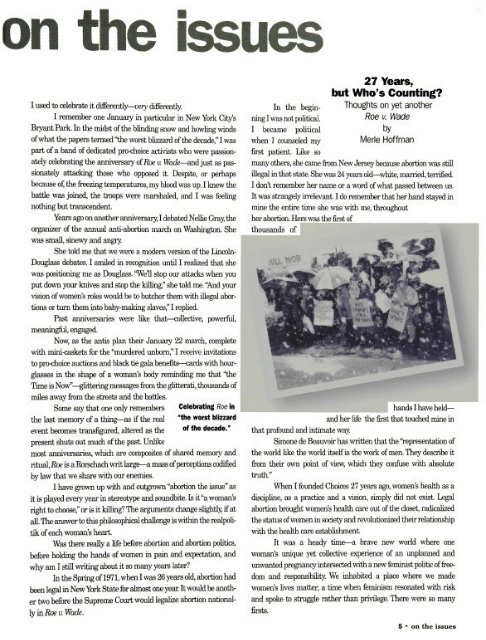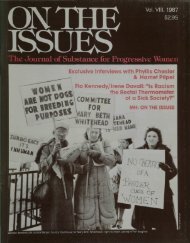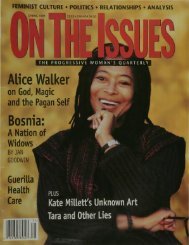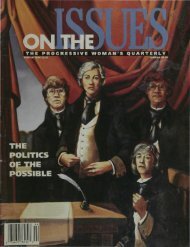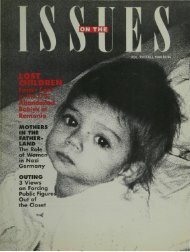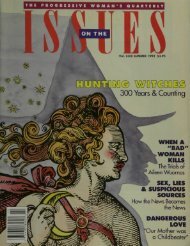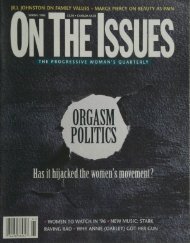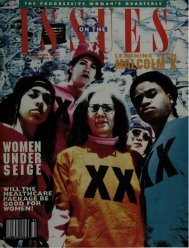women histories, incest sexual abuse. institutionalized. But what if ...
women histories, incest sexual abuse. institutionalized. But what if ...
women histories, incest sexual abuse. institutionalized. But what if ...
You also want an ePaper? Increase the reach of your titles
YUMPU automatically turns print PDFs into web optimized ePapers that Google loves.
on the issues<br />
I used to celebrate it d<strong>if</strong>ferently—very d<strong>if</strong>ferently<br />
I remember one January in particular in New York City's<br />
Bryant Park. In the midst of the blinding snow and howling winds<br />
of <strong>what</strong> the papers termed "the worst blizzard of the decade," I was<br />
part of a band of dedicated pro-choice activists who were passionately<br />
celebrating the anniversary of floe v. Wade—and just as passionately<br />
attacking those who opposed it. Despite, or perhaps<br />
because of, the freezing temperatures, my blood was up. I knew the<br />
battle was joined, the troops were marshaled, and I was feeling<br />
nothing but transcendent.<br />
Years ago on another anniversary, I debated Nellie Gray, the<br />
organizer of the annual anti-abortion march on Washington. She<br />
was small, sinewy and angry<br />
She told me that we were a modern version of the Lincoln-<br />
Douglass debates. I smiled in recognition until I realized that she<br />
was positioning me as Douglass. "Well stop our attacks when you<br />
put down your knives and stop the killing," she told me. "And your<br />
vision of <strong>women</strong>'s roles would be to butcher them with illegal abortions<br />
or turn them into baby-making slaves," I replied.<br />
Past anniversaries were like that—collective, powerful,<br />
meaningful, engaged.<br />
Now, as the antis plan their January 22 march, complete<br />
with mini-caskets for the "murdered unborn," I receive invitations<br />
to pro-choice auctions and black tie gala benefits—cards with hourglasses<br />
in the shape of a woman's body reminding me that "the<br />
Time is Now"—glittering messages from the glitterati, thousands of<br />
miles away from the streets and the battles.<br />
Some say that one only remembers Celebrating Roe in<br />
the last memory of a thing—as <strong>if</strong> the real "the worst blizzard<br />
event becomes transfigured, altered as the of the decade."<br />
present shuts out much of the past. Unlike<br />
most anniversaries, which are composites of shared memory and<br />
ritual, Roe is a Rorschach writ large—a mass of perceptions cod<strong>if</strong>ied<br />
by law that we share with our enemies.<br />
I have grown up with and outgrown "abortion the issue" as<br />
it is played every year in stereotype and soundbite. Is it "a woman's<br />
right to choose," or is it killing? The arguments change slightly, <strong>if</strong> at<br />
all. The answer to this philosophical challenge is within the realpolitik<br />
of each woman's heart.<br />
Was there really a l<strong>if</strong>e before abortion and abortion politics,<br />
before holding the hands of <strong>women</strong> in pain and expectation, and<br />
why am I still writing about it so many years later?<br />
In the Spring of 1971, when I was 26 years old, abortion had<br />
been legal in New York State for almost one year. It would be another<br />
two before the Supreme Court would legalize abortion nationally<br />
in Roe v. Wade.<br />
27 Years,<br />
but Who's Counting?<br />
In the begin- Thoughts on yet another<br />
ning I was not political. Roe V. Wade<br />
I became political by<br />
when I counseled my Merle Hoffman<br />
first patient. Like so<br />
many others, she came from New Jersey because abortion was still<br />
illegal in that state. She was 24 years old—white, married, terr<strong>if</strong>ied.<br />
I don't remember her name or a word of <strong>what</strong> passed between us.<br />
It was strangely irrelevant. I do remember that her hand stayed in<br />
mine the entire time she was with me, throughout<br />
her abortion. Hers was the first of<br />
thousands of I<br />
hands I have held—<br />
and her l<strong>if</strong>e the first that touched mine in<br />
that profound and intimate way<br />
Simone de Beauvoir has written that the "representation of<br />
the world like the world itself is the work of men. They describe it<br />
from their own point of view, which they confuse with absolute<br />
truth."<br />
When I founded Choices 27 years ago, <strong>women</strong>'s health as a<br />
discipline, as a practice and a vision, simply did not exist. Legal<br />
abortion brought <strong>women</strong>'s health care out of the closet, radicalized<br />
the status of <strong>women</strong> in society and revolutionized their relationship<br />
with the health care establishment.<br />
It was a heady time—a brave new world where one<br />
woman's unique yet collective experience of an unplanned and<br />
unwanted pregnancy intersected with a new feminist politic of freedom<br />
and responsibility. We inhabited a place where we made<br />
<strong>women</strong>'s lives matter; a time when feminism resonated with risk<br />
and spoke to struggle rather than privilege. There were so many<br />
firsts.<br />
5 - on the issues


